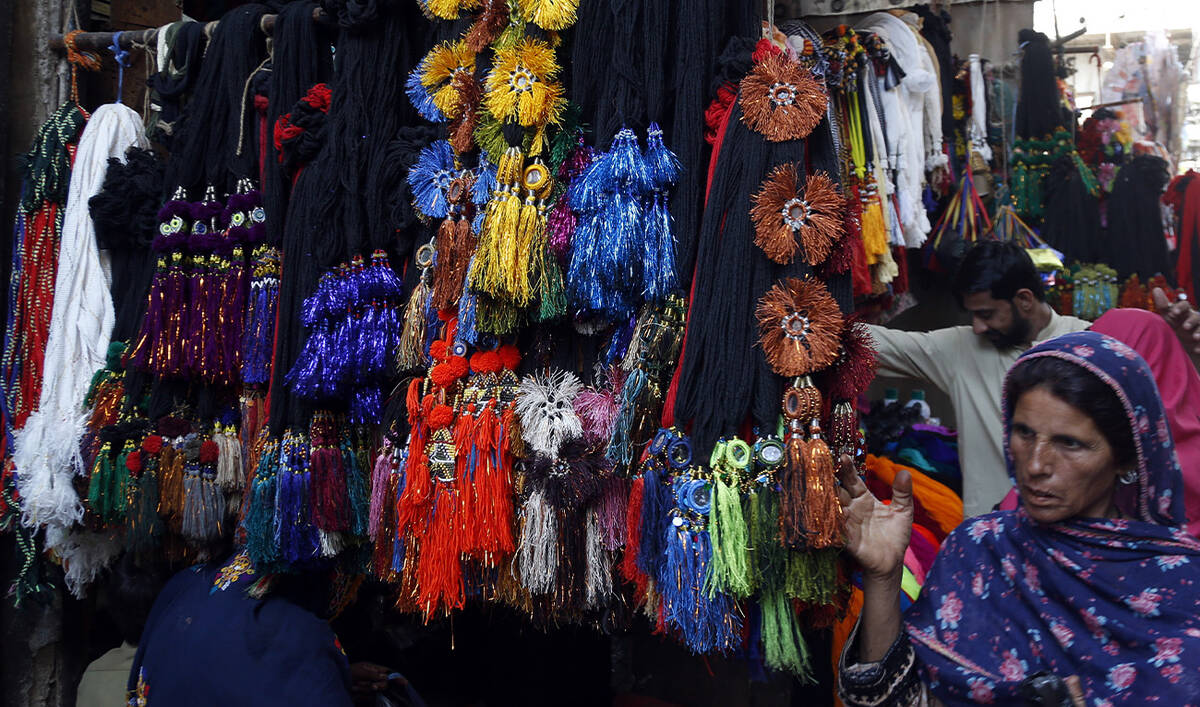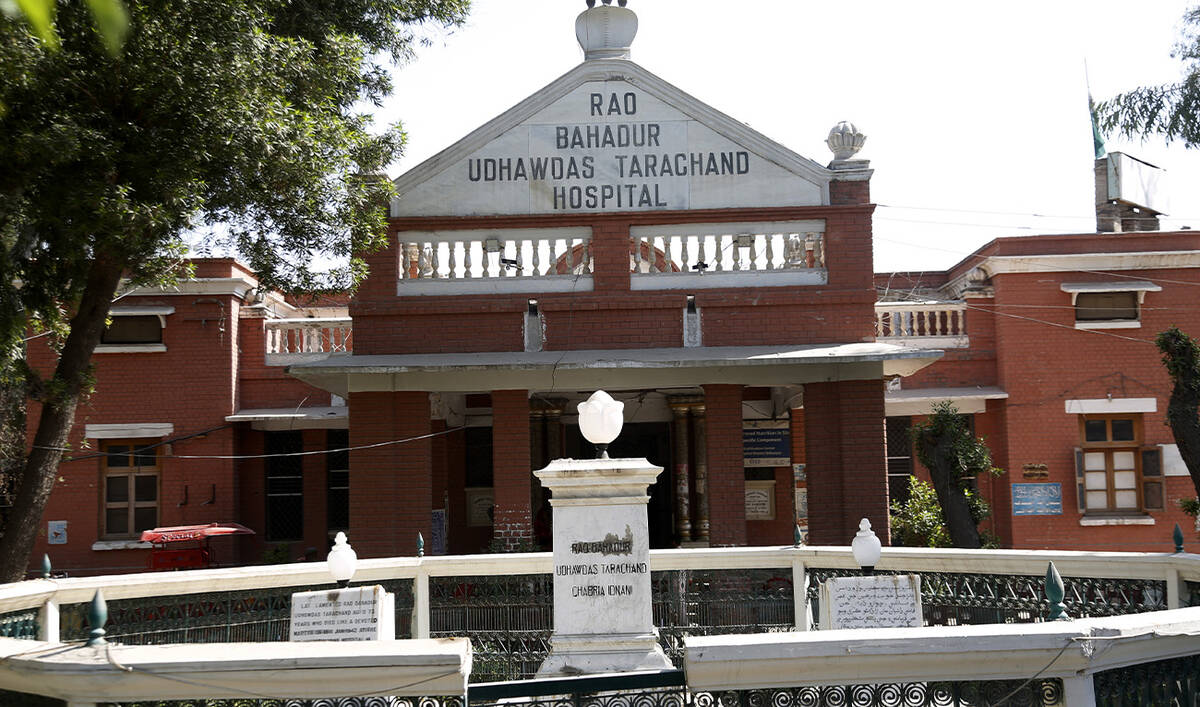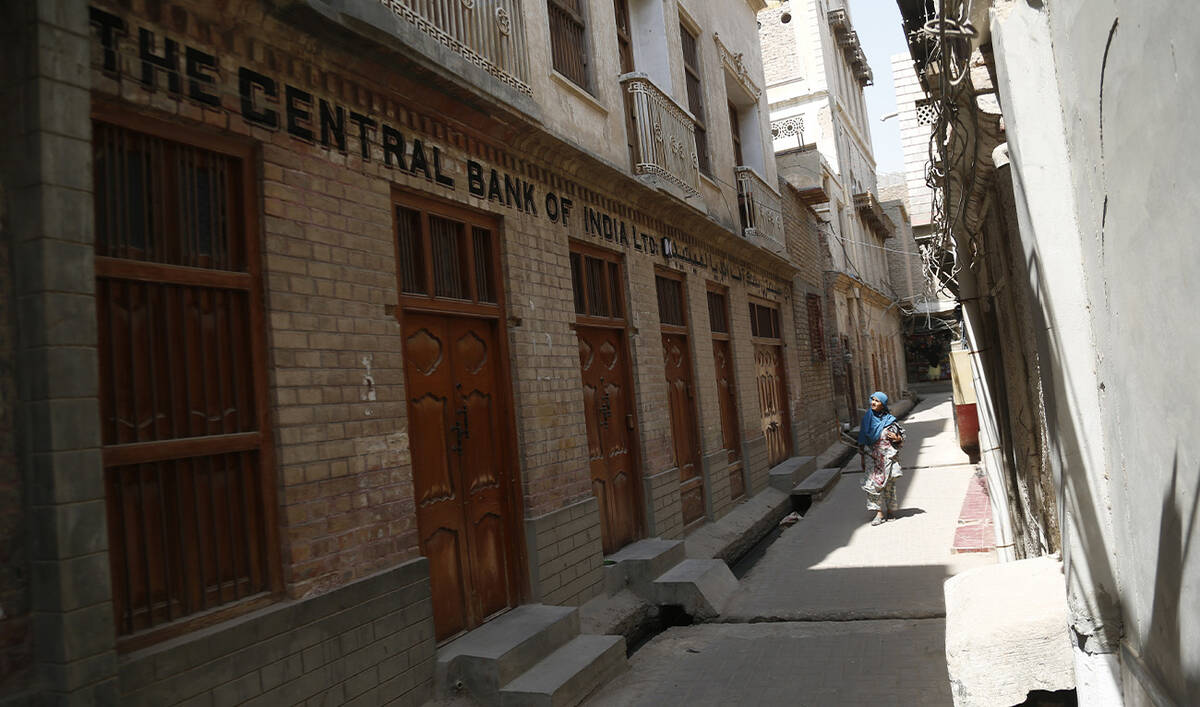QUETTA: Dawood Khan, 18, took a moment before he dived into a cold, fresh water pool in southwest Pakistan to cool off his body as mercury rose to 40 degrees Celsius in Quetta, the capital of Balochistan province, last week.
Khan, a resident of Quetta’s Pashtoonabad neighborhood, traveled on a motorbike some 34 kilometers to Hanna Urrak valley along with his friends to freshen up their bodies and minds in the blistering weather.
The 18-year-old was among dozens of Quetta residents who formed queues and awaited their turns to jump into the pool surrounded with trees after they escaped a prolonged power breakdown in Quetta.
“We haven’t witnessed that much heat in the last 10 years. The temperature has risen to 40 degrees Celsius which is unbearable for us,” Khan told Arab News on Friday.
“We have come here (Hanna Urrak valley) with friends to spend eight, nine hours in this water pool. We will return home in the evening.”
Pakistan has been in the grip of intense heat since May, with temperatures exceeding 50 degrees Celsius in southern parts of the country, which ranks among 10 most vulnerable nations to climate change.
Despite the hot weather, most rural areas of Balochistan, Pakistan’s largest and most impoverished province, have been braving up to 18-hour power outages a day, while residents of Quetta face up to eight-hour power cuts. The provincial government often accuses the federal government of not providing Balochistan’s due share of electricity, while the federation blames the outages on power theft.
In the mountainous Hanna Urrak valley, natural water fountains and swimming pools constructed by local tribesmen tempt residents of Quetta during the summer months.
Muhammad Ismail, an 18-year-old resident of Quetta’s Hazar Ganji area, said they had come out of their homes and traveled this far to visit the valley and refresh themselves by bathing in the fresh water pool.
“There is too much load-shedding in Quetta,” he told Arab News. “Hence, we decided to travel to Hanna Urrak rather than staying at home.”
In 2022, unprecedented monsoon floods washed away a majority of these privately-owned swimming pools. However, three of them survived the destruction and are still functional, attracting swarms of people from Quetta and other parts of Balochistan as well as the neighboring Sindh province to the famous summer spot.
Abdul Malik, who owns one of the swimming pools, said people visited the valley for picnic and loved swimming in these small, fresh water pools. “I have constructed this pool for the residents of Quetta which has been providing me with income for my children,” the 60-year-old said.
Describing the ongoing summer season as the “hottest ever,” Malik said people visited Hanna Urrak valley and his pool from as far as Sindh’s Sukkur and Jacobabad districts. “We charge them 100 rupees ($0.36) with unlimited swimming time,” he added.
Taufique Ahmed, 16, who came from Sukkur, said he had been swimming in the pool for the last six hours to beat the scorching heat. “I am here in Quetta to avoid sizzling temperatures in my home city, but the weather has turned fiery in Quetta as well,” Ahmed added.
The weather in Quetta and other parts of Pakistan is rapidly changing due to the impact of climate change, increase in humidity and a lack of tree plantation, according to Mukhtar Magsi, a deputy director at the Pakistan Meteorological Department (PMD) in Quetta.
“People should be given awareness of the changing weather patterns and they should be encouraged for tree plantation because the temperatures will further rise in the future,” Magsi warned.
In southwest Pakistan, people turn to fresh water pools to beat the heat
https://arab.news/vqe2h
In southwest Pakistan, people turn to fresh water pools to beat the heat

- Pakistan has been in the grip of intense heat since May, with temperatures exceeding 50 degrees Celsius in southern parts of the country
- Residents of Pakistan’s Balochistan province visit fresh water pools in mountainous Hanna Urrak valley to escape the heat, power cuts
Pakistan army chief vows ‘swift, resolute’ response to any military action by India

- General Syed Asim Munir witnesses Pakistan army’s high-intensity field training exercise drill near Jhelum
- Tensions surged after India blamed Pakistan for Apr. 22 attack on tourist resort in Indian-administered Kashmir
ISLAMABAD: Pakistan Army Chief General Syed Asim Munir on Thursday vowed that any military misadventure by India would be met with a “swift, resolute” response amid surging tensions between the nuclear-armed neighbors.
These remarks came from Munir while he visited the Tilla Field Firing Ranges (TFFR) near the eastern city of Jhelum to witness “Exercise Hammer Strike,” a high-intensity field training exercise conducted by Pakistan Army’s Mangla Strike Corps. The army continued to hold war exercises on Thursday in a bid to demonstrate its military might to its neighbor.
Pakistan has vowed to give a befitting and “strong” response to any military action by India as tensions surged after New Delhi blamed Islamabad for being involved in an attack on Indian-administered Kashmir on Apr. 22.
Islamabad has denied involvement in the attack, which killed 26 people and prompted both countries to take several hostile measures against each other. These included India suspending a decades-old water-sharing treaty, suspending visas for Pakistani nationals and declaring its military advisers “persona non grata.” Pakistan responded with tit-for-tat measures.
“Let there be no ambiguity: any military misadventure by India will be met with a swift, resolute, and notch-up response,” Munir was quoted as saying by Pakistan military’s media wing. “While Pakistan remains committed to regional peace, our preparedness and resolve to safeguard national interests is absolute.”

Munir lauded the high morale, combat proficiency and warfighting spirit of Pakistan’s officers and troops at the firing ranges, terming them the “embodiment of Pakistan Army’s operational excellence.”
The military said that the exercise was designed to validate combat readiness, battlefield synergy and operational integration of cutting-edge weapon systems under near-battlefield conditions.
“A diverse array of advanced capabilities, including multirole fighter aircraft, combat aviation assets, long-range precision artillery and next-generation field engineering techniques were employed to simulate conventional battlefield scenarios,” it said.
RUBIO CALLS FOR DE-ESCALATION
Separately, US Secretary of State spoke to Prime Minister Shehbaz Sharif on Wednesday to discuss the regional situation. As per the US State Department, Rubio urged Islamabad to cooperate in the attack’s investigation and de-escalate the situation.
“The Secretary urged Pakistani officials’ cooperation in investigating this unconscionable attack,” the State Department said. “He also encouraged Pakistan to work with India to de-escalate tensions, re-establish direct communications, and maintain peace and security in South Asia.”
According to Sharif’s office, the Pakistani premier asked Washington to impress upon India to “act responsibly” and “dial down the rhetoric.”
“He [Sharif] categorically rejected Indian attempts to link Pakistan to the incident and pointed to his call for a transparent, credible, and neutral investigation to bring out the facts,” the PMO said.
Rubio also spoke to India’s External Affairs Minister Subrahmanyam Jaishankar on Wednesday, expressing sorrow for the loss of lives in the Apr. 22 attack. He also encouraged India to work with Pakistan to de-escalate tensions and maintain peace and security in South Asia, the State Department said.
India poses serious threats to regional peace, Pakistan tells OIC envoys

- Tensions surged after India blamed Pakistan for deadly attack on tourists in Indian-administered Kashmir on Apr. 22
- Several countries such as US, UK, Iran, China, Saudi Arabia, UAE and others have called on both sides to show restraint
ISLAMABAD: Pakistan’s Permanent Representative to the United Nations (UN) Ambassador Asim Iftikhar briefed the Organization of Islamic Cooperation (OIC) Group of Ambassadors about Islamabad’s ongoing tensions with New Delhi on Thursday, state-run media reported, informing them that New Delhi poses serious threats to regional peace and security.
Tensions have surged between the two countries following a deadly attack on tourists in Indian-administered Kashmir on Apr. 22 that New Delhi has said Pakistan was involved in. Islamabad denies the charges and has said it will participate in any credible and transparent investigation of the assault.
Several countries such as China, Saudi Arabia, Iran, UK, US and others have called upon both India and Pakistan to exercise restraint and avoid a military confrontation. Pakistan has vowed to give a “strong” response to any aggression after Indian Prime Minister Narendra Modi gave the military freedom to respond to the Kashmir attack during a closed-door meeting earlier this week.
“He informed the participants that India, through its politically motivated, irresponsible and highly provocative behavior, has posed serious threats to regional peace and stability,” Radio Pakistan said on Thursday.
The state-run media said OIC members expressed full support and solidarity with Pakistan, calling for “de-escalation through diplomatic engagement” and urging the resolution of the Kashmir dispute in accordance with UN Security Council and OIC resolutions.
India and Pakistan both claim the entire disputed Kashmir region but administer only parts of it. New Delhi accuses Islamabad of funding militants in the valley which Islamabad denies.
On Wednesday, Prime Minister Shehbaz Sharif urged US Secretary of State Marco Rubio during a phone call to impress upon New Delhi to “act responsibly” amid fears of a military confrontation breaking out between nuclear-armed neighbors.
Pakistani state media had also reported that a “timely” response by the Pakistan Air Force on Wednesday had “forced” four Indian Rafale jets to retreat after payrolling near the two nations’ de facto border.
‘Treasure of history’: Shikarpur’s fading grandeur tells a story of loss

- Located in southern Sindh, Shikarpur city was once a major regional trade hub
- The 1947 migration of Hindus left the city’s architectural legacy neglected
SHIKARPUR, Sindh: Once dubbed the “Paris of Sindh” for its perfumed gardens and vibrant markets, the historic city of Shikarpur in Pakistan’s southeastern region now stands as a shadow of its former self — its havelis weathered, its bazaars dimmed and its legacy slipping into silence.
Founded in 1617, the city was once home to grand mosques, ornate Hindu temples and covered markets. These structures continue to stand as a tribute to Shikarpur’s bygone era, marked by extraordinary economic supremacy and cultural diversity.
The city rose to prominence during the eighteenth and nineteenth centuries as a powerful trade hub linking South and Central Asia. Its merchants dealt in precious stones, textiles and other high-value goods, extending their influence to markets in Kabul, Bukhara, Samarkand and beyond.
“It’s like a treasure of history. It’s like a treasure of heritage sites,” said Professor Anila Naeem, whose 2017 book, Urban Traditions and Historic Environments in Sindh: A Fading Legacy of Shikarpur, extensively documents the city’s historic fabric.
“For me the woodwork is the most fascinating,” she added. “Woodwork, which is not just plain and simple woodwork, but it has iconography in it which reflects the religious inclinations, the political inclinations ... those buildings speak of the history of that city, which was definitely very, very rich.”

Rajpal Rewachand, a businessman and lawyer in the city, maintained the role of Hindu settlers was pivotal in the city’s development, noting that their arrival along trade paths spurred commercial expansion and the construction of many still-standing heritage structures.
“The city’s development happened when Hindu settlers arrived,” he said while standing within the historic Pooj Udasin Samadha Ashram, a once-thriving religious and community complex.
“Before them, the majority of the residents were either Punjabis or people who had migrated from Tashkent, Samarkand and Bukhara.”
The city’s signature Dhak Bazaar, a covered market said to be one of the oldest of its kind in South Asia, and landmarks like the Shahi Bagh, Clock Tower and Tara Chand Hospital were once considered marvels of civic infrastructure.
At the height of its economic might, Shikarpur operated both formal and informal financial systems. The informal banking system was so reliable, according to locals, it made traveling with cash unnecessary.
“If someone had to travel to any corner of the world, they wouldn’t carry money with them,” said Nazeer Ahmed Qureshi, a cloth merchant in Dhak Bazaar, adding a stamped note by a local merchant would get him money.

“No matter where in the world one traveled, Shikarpur’s money was recognized,” he added.
But the city that was once surrounded by lush gardens and fruit groves is now clearly in decline.
According to Mehdi Shah, a local researcher and author, Shikarpur went into a downward spiral after the Hindu trading families were uprooted during the 1947 Partition.
“After the Partition of India, the Hindu population migrated, and their architectural legacy was not maintained as it once was,” he said.
As the city’s ownership shifted and wealth drained away, its buildings were left to deteriorate. Those who moved into the once-grand havelis lacked the means to preserve them, accelerating the decline.

“The shift in ownership, coupled with the activities of antique dealers, has placed these architectural treasures at increased risk,” Shah added.
The decay is not just physical but institutional. Despite a 1998 notification declaring the entire city a heritage site under the Sindh Cultural Heritage Protection Act — and a 2013 effort to designate 1,203 properties as protected — most of Shikarpur’s historic buildings have been left to deteriorate.
Professor Naeem said that restoration could help revive both the city’s cultural pride and economic fortunes, particularly if Pakistan invests in heritage tourism.
Sitting amid the fading relics in the heart of Dhak Bazaar, cloth merchant Qureshi reflects on the distance between memory and present reality.
“Such a beautiful past— such a grand historical city, a magnificent city with its rich culture, trade, lifestyle,” he said, his voice echoing through the narrow, shop-lined passage. “It feels like a dream, as if stepping into another world.”
3 Pakistani security personnel killed in raid on a militant hideout

- Pakistan police say insurgents were “Khawarij,” a term government uses for Pakistani Taliban
- Last week Pakistani forces killed 71 militants attempting to enter through Afghanistan, says military
PESHAWAR: Pakistani security forces overnight raided a militant hideout in northwest Pakistan, sparking a shootout in which three officers and one suspect were killed, police said Thursday.
The raid occurred in Bannu, a district in the Khyber Pakhtunkhwa province, police Arshad Khan said. Other insurgents fled the scene. Khan said the insurgents were “Khwarij” — a phrase the government uses for the Pakistani Taliban.
The Pakistani Taliban, known as Tehreek-e-Taliban Pakistan, have launched some of the deadliest attacks against Pakistani law enforcers and civilians since 2007.
Last week, Pakistani security forces killed 71 militants when they attempted to cross into the country from Afghanistan, according to the military.
Pakistani Kashmir closes seminaries fearing Indian military strikes

- Islamabad says has credible intelligence India intends to launch military action soon
- Muslim-majority Kashmir is claimed in full but ruled in parts by both India and Pakistan
MUZAFFARABAD: The government of Pakistan-administered Kashmir has closed all religious seminaries in the region for 10 days, officials said on Thursday, citing fears they would be targeted by Indian strikes following a deadly attack on tourists in Indian Kashmir.
Islamabad says it has credible intelligence that India intends to launch military action soon, with New Delhi alleging that the attack on tourists was carried out by Pakistani nationals with ties to militant organizations based there.
The director of Pakistani Kashmir’s Department of Religious Affairs, Hafiz Nazir Ahmad, told Reuters that security officials feared Indian forces may target seminaries and label them as militant training centers.
The notification seen by Reuters, dated April 30, only cited a heatwave as the reason for the closure.
“Right now, we are facing two kinds of heat — one from the weather and the other from (Indian Prime Minister) Modi,” Ahmad said of the notification, saying they did not mention the risk of attacks in a bid to avoid panic.
India’s foreign ministry did not immediately respond to a request for comment. India has previously targeted sites in Pakistan alleging they were bases of militants close to the Kashmir border.
“We held a meeting yesterday in which it was unanimously decided not to put innocent children at risk,” Ahmad said. The President’s Office of Pakistani Kashmir also said the closure was due to “precautionary reasons.”
There are 445 registered seminaries with over 26,000 students enrolled in Pakistan-administered Kashmir, according to the religious affairs department.
The seminaries — locally known as madrasas — are Islamic educational institutions run by religious organizations, providing cheap, often free, alternatives to regular schools.
Pakistan has said it will respond “assuredly and decisively” to any military action from India, raising the specter of war between the two nuclear-armed countries.
Kashmir, a Muslim-majority Himalayan region, is claimed in full but ruled in parts by both India and Pakistan, and has been the site of two wars and multiple skirmishes.
Many Muslims in Indian Kashmir have long resented what they see as heavy-handed rule by India. In 1989, an insurgency by Muslim separatists began. India poured troops into the region and tens of thousands of people have been killed.
India accuses Pakistan of arming and training militants, which Islamabad denies, saying it offers only moral and diplomatic support. Seminaries have been criticized for radicalizing youth toward extremism.











